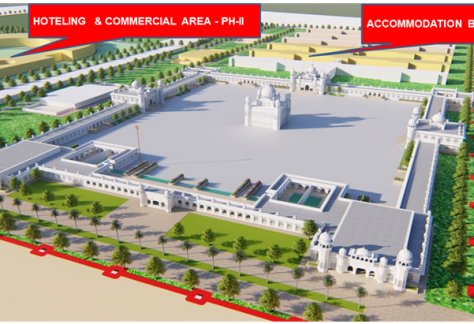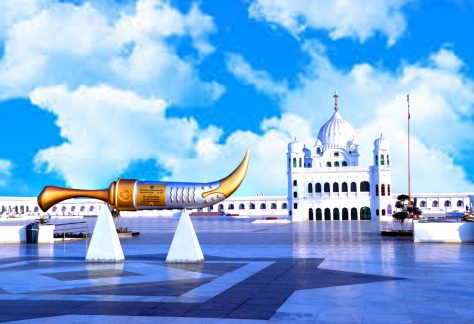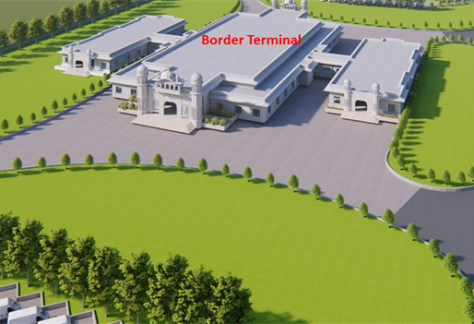The Kartarpur Corridor, a symbol of faith and unity, holds deep historical and spiritual importance. Founded by Guru Nanak Dev Ji, the first Sikh Guru, in 1504 CE, Kartarpur became the first Sikh commune on the banks of the Ravi River. After Guru Nanak's passing in 1539, Hindus and Muslims honored him by building adjoining mausoleums, showcasing a rare spirit of harmony.
Historical Significance
The Kartarpur Corridor, a symbol of faith and unity, holds deep historical and spiritual importance. Founded by Guru Nanak Dev Ji, the first Sikh Guru, in 1504 CE, Kartarpur became the first Sikh commune on the banks of the Ravi River. After Guru Nanak's passing in 1539, Hindus and Muslims honored him by building adjoining mausoleums, showcasing a rare spirit of harmony.
Following the partition of India in 1947, Kartarpur fell within Pakistan’s borders, leaving Indian Sikhs yearning for access to this sacred site. For decades, informal visits occurred until stricter border controls were enforced after the 1965 war. Despite many attempts to include Kartarpur in bilateral agreements, it wasn’t until the early 2000s that significant progress was made.
In 2004, the Pakistani government restored the Gurdwara Kartarpur Sahib, turning it into a place of spiritual solace for pilgrims worldwide. The corridor, inaugurated in 2019, now allows Sikhs from India to visit this sacred site visa-free, bridging hearts across borders and honoring the legacy of Guru Nanak Dev Ji.
About Kartarpur Corridor
Pakistan, the sacred land of Sikhism, holds immense significance for Sikhs worldwide. Baba Guru Nanak Dev Ji, the founder of Sikhism, spent the last 18 years of his life in Kartarpur, where he preached unity and spirituality. Upon his passing on September 22, 1539, a unique tradition was born when Hindus and Muslims, unable to agree on the last rites, honored him with both cremation and burial rituals. Today, the Gurdwara houses both a Samadhi and a Mazaar, symbolizing communal harmony and reverence.
The original Gurdwara, established by Guru Nanak in 1515, was washed away by the floods of the Ravi River. Later, Maharaja Ranjit Singh rebuilt the current structure in the 19th century. After the partition in 1947, the Sikh community migrated to India, leaving the Gurdwara abandoned. Despite decades of longing from Sikhs across the globe, access remained a challenge.
Today, under a historic Memorandum of Understanding (MoU) between Pakistan and India, the Kartarpur Corridor allows up to 5,000 Indian yatrees daily to visit this holy site visa-free. This monumental initiative is a testament to Pakistan Sikh Gurdwara Parbandhak Committee's (PSGPC) unwavering efforts to preserve Sikh heritage and facilitate pilgrims. The Kartarpur Corridor stands as a beacon of peace, offering Sikhs worldwide an opportunity to reconnect with their spiritual roots in the heart of Pakistan.
Design & Construction
The Kartarpur Gurdwara complex has been meticulously designed to accommodate the growing number of pilgrims from around the world. Spread across 42 acres, the complex includes: hundreds of apartments, two commercial areas, two car parking lots, border facility area, tourist information center, 13-bed medical center founded by renowned physician Dr. Umair. The masterplan also considers visitors from countries other than India, with modern infrastructure and facilities ensuring comfort and accessibility. Over 400 acres of land were acquired by the Government of Pakistan to develop the complex and its surroundings.
The foundation stones for the Kartarpur Corridor were laid in November 2018 by Pakistan’s Prime Minister Imran Khan and India’s Vice President Venkaiah Naidu on their respective sides. On the Pakistani side, the Frontier Works Organization (FWO) constructed: a 4.7 km expressway, an 800-meter bridge over the Ravi River, fully equipped immigration office, expanded premises of the Gurdwara Darbar Sahib.









Role of PSGPC
The Pakistan Sikh Gurdwara Prabandhak Committee (PSGPC) has played a crucial role in the establishment, operation, and maintenance of the Kartarpur Corridor, which connects Gurdwara Darbar Sahib in Kartarpur, Pakistan, to Dera Baba Nanak in Gurdaspur, India. This corridor, inaugurated on November 9, 2019, allows visa-free access for Sikh pilgrims to visit one of the holiest sites in Sikhism, where Guru Nanak Dev Ji spent the last years.
PSGPC collaborated with the Pakistani government to ensure the completion of key infrastructure, including the construction of a bridge over the Ravi River and the enhancement of facilities at Gurdwara Darbar Sahib. The design and preservation efforts were conducted under PSGPC's guidance to ensure the site's sanctity. PSGPC oversees arrangements for pilgrims, including accommodations, transport, and provisions for langar (community meals). Dedicated security measures and streamlined administrative processes ensure a safe and seamless pilgrimage experience.
PSGPC has focused on maintaining the site's historical and religious significance by restoring and preserving sacred structures and relics. Regular religious events like Nagar Kirtan and Akhand Path Sahib are conducted under its supervision. The corridor has been hailed as a "Corridor of Hope" by international observers, including the UN, for fostering interfaith and cross-border harmony. PSGPC plays an active role in promoting this narrative.
Location





